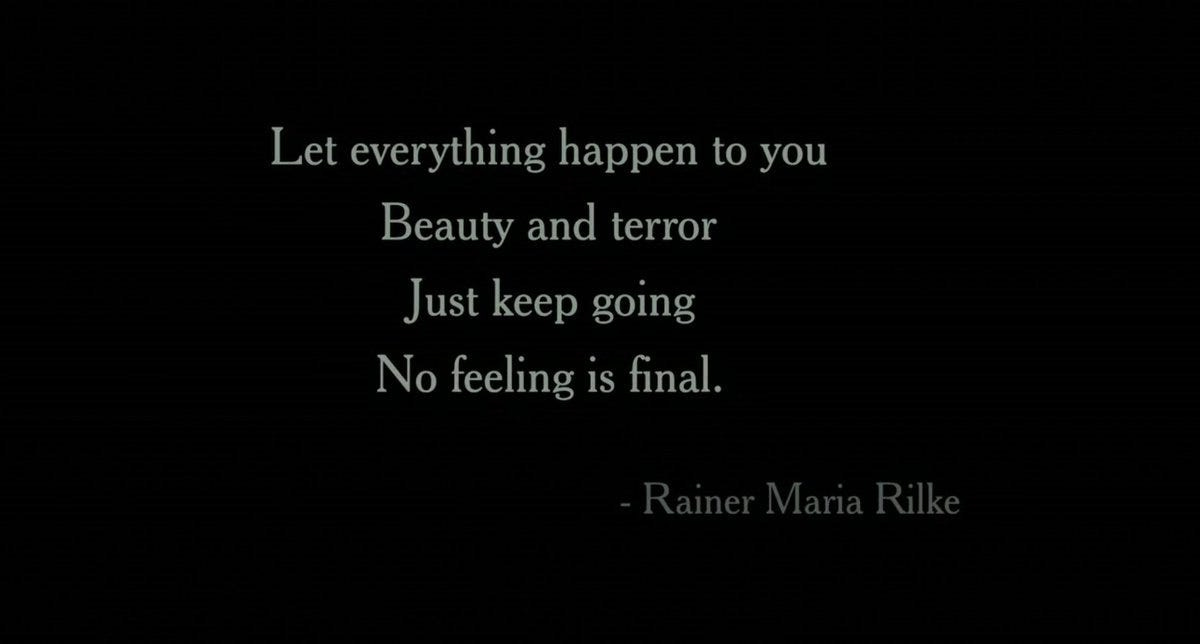No Feeling Is Final: Reading Rilke & Rewatching Jojo Rabbit in Austria
The Austrian poet is one of Western pop culture's favorites—his message? Let it all in, but not just for your own personal fulfilment.
Yeah, I’m still on the road in Europe for work and I’m writing about Rilke AGAIN. God, why am I like this? Or maybe the better question is, why is Western culture like this?
Rilke is a wonderful poet to read for anyone who is living a peripatetic existence, even for a short time, as I am now. Paris, Prague, Bremen. It feels almost as if I’m following in his footsteps, although much, much less brilliantly so. I’m in Austria now—the country that gave the world Rainer Maria Rilke—and meditating on his letters in the shadow of Austria’s mothering mountains has been transformative.
But I went to see the house where he spent his early years in Prague yesterday with a new friend. As I stood there, I tried to imagine a portal opening up between his time and mine.
But then I realized that the real portal isn’t in Prague or where he’s buried in Raron, Switzerland. It’s in his poems.
He died young of leukemia, which makes us wonder what could have been. He wrote of god and love and death and all the big, scary topics that we openly advise new writers to avoid (and as Rilke himself advises Franz Kappus to avoid in Letters to a Young Poet). He mastered the elegy. He was often prophetic or seemed so. He wrote often about god but hated organized religion. His images grab you, hold you and give you a shake you can’t forget.
The list of reasons for Rilke’s persistence as one of our favorite poets stretches on.
One of his fans is, evidently, writer and director Taika Waititi, who added a Rilke quote to the end of Jojo Rabbit, a film that centers on 10-year-old Johannes “Jojo” Betzler, who daydreams of being besties with Hitler (Waititi) and becoming a good little Nazi but finds himself too timid to kill a rabbit, hence the nickname. To his horror, Jojo discovers that his beloved mother (Scarlett Johansson) has been harboring a young Jewish girl named Elsa (Thomasin McKenzie) in the family’s attic.
The film’s humor is bizarre and wonderful, and the levity of the film is tempered by a deep and brutal sadness that’s just right.
The Rilke quote included at the end of the film does not appear in Caging Skies, the novel written by Christine Leunens that inspired the film, which makes it officially a Waititi Joint™. It’s a famous quote, though imperfectly rendered: the original punctuation makes the work clearer, and reads this way:
Let everything happen to you: beauty and terror.
Just keep going. No feeling is final.
These lines come from the poem known as “Go to the Limits of Your Longing,” one of a deep spiritual sentiment pulled from The Book of Hours (1905). A kind of companion to the Book of Images (1902), Hours is the text that made him popular.
It’s bold to end a film about genocide and loss with such words. “Let everything happen to you” is such a balm to me as a poet and longtime reader of Rilke, but it is possible to feel that the words are hollow in comparison to the staggering tragedies of WWII.
Rilke translator and NYU professor Ulrich Baer, in conversation with James Devitt, had this to say about Waititi’s use of the famous poet in Jojo Rabbit:
In the context of the movie, the message is that love can conquer hate, even if we will experience terrible loss. The poem further says that even the most extreme experiences and emotions will not last, and that sometimes just keeping faith in the passage of time—rather than worrying about it— can relieve us from pain which threatens to overwhelm us. I absolutely think that the filmmaker captured something essential about Rilke’s poetry, namely the belief that acknowledging the beauty and terror of a given moment allows us to experience the world fully, without being overwhelmed or overlooking much of it.

As much as we don’t want religion to alienate viewers of the film or readers of Rilke, I think the missing piece here is the line missing from the stanza often excerpted: “Don’t let yourself lose me.” The me, of course, is god in this poem. Waititi and many others like to leave this line out for the usual reasons. But fear not, agnostics, atheists, and spiritual-minded folk: Rilke’s god is not a narrow one.
One of Rilke’s most mystical and meaningful missives in the well-known Letters to a Young Poet has to do with a comforting idea about where and when god is. In the sixth letter, Rilke offers this paradigm-altering conception of god not as one who was with us in a glorious past and is now lost, but one who has not yet been with us, ever.
Just as Rosie grabs Jojo’s head and forces him to look at the hanged bodies of those who attempted to stand against the rise of Hitler and his party, so too does Rilke exhort us to take it all in and help give birth to something better in the process:
Why don’t you think of him as the one who is coming, who has been approaching from all eternity, the one who will someday arrive, the ultimate fruit of a tree whose leaves we are? What keeps you from projecting his birth into the ages that are coming into existence, and living your life as a painful and lovely day in the history of a great pregnancy?
…As bees gather honey, so we collect what is sweetest out of all things and build Him. Even with the trivial, with the insignificant (as long as it is done out of love) we begin, with work and with the repose that comes afterward, with a silence or with a small solitary joy, with everything that we do alone, without anyone to join or help us, we start Him whom we will not live to see, just as our ancestors could not live to see us…
…He needs this very anguish of yours in order to begin… Be patient and without bitterness, and realize that the least we can do is to make coming into existence no more difficult for Him than the earth does for spring when it wants to come.
This ripened stanza and indeed the entire poem Waititi excerpts give the fullest picture of what Rilke is talking about. We should not merely let everything happen to us for mere amusement or personal fulfillment. But if we allow everything to happen to us and change us, we may then be able to bring about a better world and even create the divine.
Blasphemous, or brilliant?
I’ll let you decide whether to answer the poet’s final call in this poem:
Nearby is the country they call life.
You will know it by its seriousness.Give me your hand.
Related
Jack Donaghy, Rilke, and the Sexiest Drunk Dial Ever
I’m on the road in Europe for work this month, so this post is going to be short, sweet, and damn sexy. Coming to you live from Kropp, Germany, it’s time for a little Deutsch—and a writing prompt—in your life, nein?








Caitlin, surprisingly or not, the quote in the "Jojo Rabbit" movie, was my first approach to Rilke's work. This was admiration at first sight. Thanks a lot for the post. It was interesting and thought-provoking. Keep the great work!